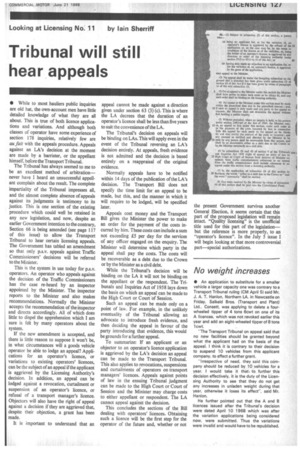Looking at Licensing No. 11 by lain Sherriff
Page 129

If you've noticed an error in this article please click here to report it so we can fix it.
Tribunal will still hear appeals
• While to most hauliers public inquiries are old hat, the own-account men have little detailed knowledge of what they are all about. This is true of both licence applications and variations. And although both classes of operator have some experience of section 178 inquiries, relatively few are au fait with the appeals procedure. Appeals against an LA's decision at the moment are made by a barrister, or the appellant himself, before the Transport Tribunal.
The Tribunal has always seemed to me to be an excellent method of arbitration— never have I heard an unsuccessful appellant complain about the result. The complete impartiality of the Tribunal impresses all, and the almost complete absence of appeals against its judgments is testimony to its justice. This is one section of the existing procedure which could well be retained in any new legislation, and now, despite an earlier Government intention to the contrary, Section 66 is being amended (see page 117 of this issue) to allow the Transport Tribunal to hear certain licensing appeals. The Government has tabled an amendment so that only p.s.v. appeals against Traffic Commissioners' decisions will be referred to the Minister.
This is the system in use today for p.s.v. operators. An operator who appeals against the decision of the Traffic Commissioners has the case re-heard by an inspector appointed by the Minister. The inspector reports to the Minister and also makes recommendations. Normally the Minister accepts the recommendation of the inspector and directs accordingly. All of which does little to dispel the apprehension which I am sure is felt by many operators about the system.
If the new amendment is accepted, and there is little reason to suppose it won't be, in what circumstances will a goods vehicle operator be able to lodge an appeal? Applications for an operator's licence, or variations to existing operators' licences, can be the subject of an appeal if the applicant is aggrieved by the Licensing Authority's decision. In addition, an appeal can be lodged against a revocation, curtailment or suspension of an operator's licence, or refusal of a transport manager's licence. Objectors will also have the right of appeal against a decision if they are aggrieved that, despite their objection, a grant has been made.
It is important to understand that an appeal cannot be made against a direction given under section 63 (3) (c). This is where the LA decrees that the duration of an operator's licence shall be less than five years to suit the convenience of the LA.
The Tribunal's decision on appeals will be binding on LAs. This will apply even in the event of the Tribunal reversing an LA's decision entirely. At appeals, fresh evidence is not admitted and the decision is based entirely on a reappraisal of the original evidence.
Normally appeals have to be notified within 14 days of the publication of the LA's decision. The Transport Bill does not specify the time limit for an appeal to be made, but this, and the manner in which it will require to be lodged, will be specified later.
Appeals cost money and the Transport Bill gives the Minister the power to make an order for the payment of the costs in curred by him. These costs can include a sum not exceeding £5 per day for the services of any officer engaged on the enquiry. The Minister will determine which party in the appeal shall pay the costs. The costs will be recoverable as a debt due to the Crown or by the Minister as a civil debt.
While the Tribunal's decision will be binding on the LA it will not be binding on the appellant or the respondent. The Tribunals and Inquiries Act of 1958 lays down the basis on which an appeal can be made to the High Court or Court of Session.
Such an appeal can be made only on a point of law. For example, in the unlikely eventuality of the Tribunal allowing an advocate to introduce fresh evidence, and then deciding the appeal in favour of the party introducing that evidence, this would be grounds for a further appeal.
To summarize: If an applicant or an objector to an operator's licence application
is aggrieved by the LA's decision an appeal can be made to the Transport Tribunal. This also applies to revocations, suspensions and curtailments of operators on transport managers' licences. Appeals against points of law in the ensuing Tribunal judgment
can be made to the High Court or Court of Session and the Minister may charge costs to either appellant or respondent. The LA cannot appeal against the decision.
This concludes the sections of the Bill dealing with operators' licences. Obtaining such a licence will be the first step for the operator of the future and, whether or not the present Government survives another General Election, it seems certain that this part of the proposed legislation will remain intact. "Quality licensing" is the unofficial title used for this part of the legislation— but the reference is more properly, to an "operator's licence". In the July 5 issue I will begin looking at that more controversial part—special authorizations.








































































































































































































